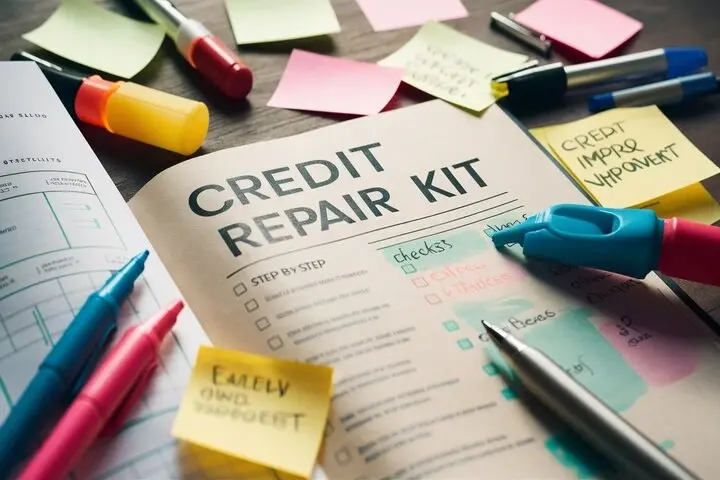A healthy credit score is essential for various aspects of life, from securing loans and mortgages to renting an apartment and even getting hired. Unfortunately, many people struggle with inaccurate or outdated information on their credit reports, leading to lower scores and financial limitations. While professional credit repair services exist, many wonder: can I effectively repair my credit myself? This comprehensive guide will explore the ins and outs of DIY credit repair, helping you determine if it's the right path for you.
Understanding Credit Reports and Scores
Before diving into the specifics of DIY credit repair, it's crucial to understand the fundamentals of credit reports and scores.
What is a Credit Report?
A credit report is a detailed record of your credit history, compiled by credit bureaus. It contains information about your:
- Personal Information: Name, address, Social Security number, date of birth.
- Credit Accounts: Credit cards, loans, mortgages, and other lines of credit, including account numbers, credit limits, balances, payment history, and dates opened/closed.
- Public Records: Bankruptcies, foreclosures, liens, and judgments.
- Credit Inquiries: A record of who has accessed your credit report.
What is a Credit Score?
A credit score is a three-digit number calculated based on the information in your credit report. It represents your creditworthiness and predicts the likelihood of you repaying debts. The most common credit scoring model is FICO, with scores ranging from 300 to 850. Generally, a higher score indicates a better credit profile.
Factors that influence your credit score include:
- Payment History: Paying bills on time is the most crucial factor.
- Amounts Owed: How much debt you have relative to your credit limits.
- Length of Credit History: The longer you've had credit accounts, the better.
- Credit Mix: Having a variety of credit accounts (e.g., credit cards, loans, mortgages) can be beneficial.
- New Credit: Opening too many new accounts in a short period can lower your score.
The Process of DIY Credit Repair
DIY credit repair involves taking proactive steps to identify and address errors or inaccuracies on your credit reports, ultimately improving your credit score. Here's a step-by-step guide:
1. Obtain Your Credit Reports
You are entitled to a free copy of your credit report from each of the three major credit bureaus – Equifax, Experian, and TransUnion – once every 12 months. You can obtain these reports at AnnualCreditReport.com. Be wary of other websites that claim to offer free credit reports, as they may be scams.
2. Review Your Credit Reports Carefully
Thoroughly examine each credit report for any errors, inaccuracies, or outdated information. Look for:
- Incorrect Personal Information: Misspelled names, wrong addresses, or incorrect Social Security numbers.
- Inaccurate Account Information: Incorrect balances, payment history, or account status (e.g., showing an account as open when it's closed).
- Duplicate Accounts: The same debt listed multiple times.
- Accounts You Don't Recognize: Potentially fraudulent accounts.
- Outdated Information: Negative information generally remains on your credit report for seven years (bankruptcies can stay for up to 10 years).
3. Dispute Inaccurate Information
If you find any errors, dispute them in writing with each credit bureau that has the inaccurate information. It's crucial to send separate disputes to each bureau, as they don't share information automatically.
How to Write a Credit Dispute Letter:
Your dispute letter should be clear, concise, and include:
- Your full name and address.
- Your Social Security number.
- The specific item(s) you are disputing, clearly identifying the account number and the bureau reporting the information.
- A detailed explanation of why you believe the information is inaccurate or incomplete.
- Copies of any supporting documentation, such as payment records or account statements. Never send original documents.
- A request for the bureau to investigate and correct the error.
Send your dispute letters via certified mail with return receipt requested. This provides proof that the credit bureau received your letter.
4. Credit Bureau Investigation
The credit bureaus have 30 days (in some cases, 45 days) to investigate your dispute. They will contact the creditor or data furnisher that reported the information to verify its accuracy. The creditor must provide evidence to support the information.
5. Review the Results of the Investigation
Once the investigation is complete, the credit bureau will notify you of the results. If the information is verified as accurate, it will remain on your credit report. If the information is found to be inaccurate or incomplete, it will be corrected or deleted.
6. Follow Up If Necessary
If you disagree with the results of the investigation, you have the right to request that a statement of dispute be added to your credit report. This statement will be included whenever your credit report is accessed.
7. Address Other Factors Affecting Your Credit Score
While disputing errors is crucial, it's also important to address other factors that impact your credit score, such as:
- Making On-Time Payments: Set up automatic payments or reminders to ensure you never miss a due date.
- Lowering Credit Utilization: Keep your credit card balances low relative to your credit limits (ideally below 30%).
- Avoiding Applying for Too Much Credit: Each credit application can slightly lower your score.
- Building Credit: If you have limited credit history, consider applying for a secured credit card or becoming an authorized user on someone else's account.
Pros and Cons of DIY Credit Repair
DIY credit repair offers several advantages, but it also has some drawbacks to consider.
Pros:
- Cost-Effective: DIY credit repair is significantly cheaper than hiring a credit repair company. You only pay for postage and copies of documents.
- Full Control: You have complete control over the process and can tailor your strategy to your specific needs.
- Educational: You gain a deeper understanding of credit reports, scores, and the credit repair process.
- Legal Protection: You are exercising your rights under the Fair Credit Reporting Act (FCRA).
Cons:
- Time-Consuming: DIY credit repair can be time-consuming, requiring research, letter writing, and follow-up.
- Complex: Understanding credit laws and regulations can be challenging.
- Potential for Errors: Without proper knowledge, you might make mistakes that could hinder your progress.
- No Guarantee of Success: Disputing errors doesn't guarantee they will be removed.
When to Consider Professional Credit Repair
While DIY credit repair is a viable option for many, there are situations where professional help might be beneficial:
- Complex Credit Issues: If you have numerous errors, bankruptcies, or other complicated credit problems.
- Lack of Time or Knowledge: If you don't have the time or understanding to navigate the credit repair process.
- Overwhelmed: If you feel overwhelmed or stressed by the prospect of DIY credit repair.
If you decide to hire a credit repair company, research your options carefully and choose a reputable company that complies with the Credit Repair Organizations Act (CROA).
Avoiding Credit Repair Scams
Unfortunately, the credit repair industry is rife with scams. Be wary of companies that:
- Guarantee to remove negative information: No one can guarantee results.
- Request upfront payment: This is illegal. Credit repair companies can only charge after services have been rendered.
- Tell you to create a new credit identity: This is illegal and can result in serious consequences.
- Don't explain your legal rights: Reputable companies will educate you about your rights under the FCRA and CROA.
The Fair Credit Reporting Act (FCRA)
The Fair Credit Reporting Act (FCRA) is a federal law that protects consumers by ensuring the accuracy and fairness of credit reporting. It gives you the right to:
- Access your credit reports: You are entitled to a free copy of your credit report from each of the three major credit bureaus once every 12 months.
- Dispute inaccurate information: You have the right to dispute any errors or inaccuracies on your credit report.
- Have inaccurate information corrected or deleted: The credit bureaus must investigate your disputes and correct or delete any inaccurate information.
- Add a statement of dispute to your credit report: If you disagree with the results of an investigation, you can add a statement explaining your perspective.
The Credit Repair Organizations Act (CROA)
The Credit Repair Organizations Act (CROA) is a federal law that regulates credit repair companies. It provides consumers with certain protections, including the right to:
- A written contract: The contract must clearly outline the services provided, the fees charged, and your rights under the CROA.
- A three-day right to cancel: You have three days to cancel the contract without penalty.
- Protection from unfair or deceptive practices: Credit repair companies are prohibited from making false or misleading statements about their services.











